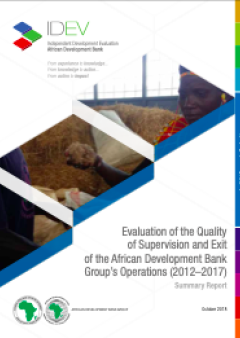
Independent Evaluation of the Quality of Supervision and Exit of African Development Bank Group Operations (2012-2017)
The evaluation sought credible evidence of the extent to which the Bank’s project supervision system is relevant, adequate and aligned with best practice; the performance of the Bank’s Quality Assurance (QA) framework during project implementation and completion; and the factors that shape supervision effectiveness. It also sought lessons that would inform the Bank’s future use of supervision under its transformation agenda. The evaluation was theory-based. It drew data from diverse sources including document reviews; interviews of Bank staff, clients in regional member countries, and staff of other international financial institutions; and site visits to 5 countries (Cameroon, Kenya, Morocco, Senegal, and Zimbabwe). Data was analysed using both qualitative and quantitative methods.
Overall, the evaluation found that the Bank is making efforts to improve its supervision practices and that there is momentum towards achieving quality in relevant areas, such as attention for project support and performance by the Senior Management. Supervision policies, guidelines and tools were found to be largely relevant and clear. However, the evaluation noted that the complementarity, use and follow up of supervision tools and teams requires strengthening, and that the Bank’s management information system does not adequately support monitoring, knowledge generation and learning. A number of recommendations are made to the Bank, including to improve the management of risks and project performance; ensure adherence to quality standards for supervision and completion; increase the credibility of results reporting; and strengthen incentives to support a results and quality culture.
